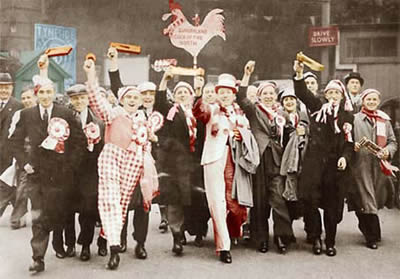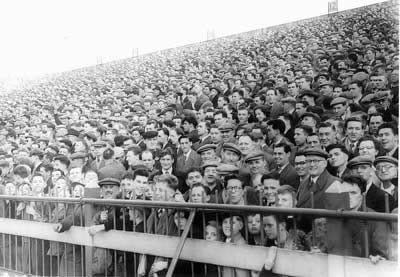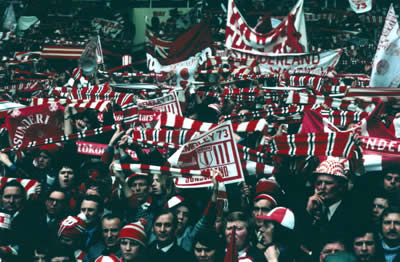the roker roar
"Amid all the hype and hysteria, it might have gone unnoticed that Sunderland are up too, but this will be put to right once Roker's red-and-white hordes begin their travels through the Premiership. Contrary to popular myth, the Geordies of Newcastle are not the most fanatically exuberant followers in British football; that honour belongs to their Sunderland rivals, the Mackems. Whether disdaining the option of sitting down for the entire duration of matches, standing bare-chested throughout the coldest January afternoon (I'm talking male fans here - Wearsiders are not that exuberant), or collectively ignoring the evidence of their eyes and acclaiming their team as the greatest the world has ever seen, Sunderland followers are in a class of their own."
Paul Wilson - The Observer – August 1996
The Roker Roar Whilst Sunderland had many venues before settling at Roker Park in 1898, the ground was made famous, and became synonymous with vocal support due to the passion with which the fans, traditionally miners and those from County Durham, displayed.
Sunderland fans en route to the 1937 FA Cup Final The hardship endured by the supporters in the shipyards and collieries during the working week meant that the release of Roker Park, turned backing the Club into a partisanship that has often led to violent incident. Like any passion it can sometimes generate white hot vitriol. The North East is a hard area, one where traditionally it often boiled down to survival of the fittest. The supporters of Sunderland AFC do not suffer fools gladly, and to paraphrase Frank Sinatra, "if you can make it here, you can make it anywhere". To many, perhaps the overwhelming majority, supporting of the red and whites is of almost religious significance, and the oft heard saying "keep the faith" is nothing blasé or crass. Unlike Glasgow however, the sectarian divide never played a part. The religion derives not from a "community" but an "intangible thing". A memory, a story, an instinctive family birthright, an emotion. Although of different origin from Rangers or Celtic, it leads to the same intense devotion. It has been said that Sunderland are the Bhoys or Gers of English football. Praise indeed to be compared with such football fanatics. Perhaps it is no co-incidence that the Roker Roar supports with such emotion a Club founded by a Scotsman, arriving from Glasgow via Ayr. Whilst supporting a football team is a personal thing, to be a member of the Roker Roar, is a selfless act. It is a contradiction which cant be explained. If you aren't a member willing to help your fellow Sunderland fan, then you betray the forefathers who went before you. Many acts within supporters' branches throughout the world have amply demonstrated a willingness to put group benefit before individual profit. No pain, no gain, as they say. If something is of importance to you then the downs are cherished almost as much as the ups. In search for the Holy Grail, it is the historical significance of the club, and the past glories it has witnessed that drives many of the fans forever onwards, with tales from their Grandfathers and fathers, whetting the footballing appetite. The Roker Roar is demanding, but in truth would the club have it any other way? At the end of the day it is evident that if something is so worthwhile to so many people then the hard times will be endured, so that the good times, when they come can be enjoyed, so very, very much. Every Club thinks that their fans are special, and rightly so, but some, including the famed Roker Roar can quite literally change the course of a game. The atmosphere generated by the Roker Roar, can at times be so intimidating that opposing teams and supporters alike have quite simply capitulated. It shouldn't be regarded as a weakness on the part of our foe, just inevitability. Many have gone before you.
The Roker End, a seething mass of humanity Danny Blanchflower once said that having travelled the world the Roker Roar was the most awesome display of support he had ever seen. The majestic and brilliant Irishman knew what he was talking about. The Roker Roar is the "secret" of Sunderland AFC, and why one day we will rediscover what past generations have raved about. Wearside is no place for the faint hearted. Shrinking violets need not apply to join our massed ranks. When success happens you can be sure that the Roker Roar will have been with the Club every step of the way, and whatever success is achieved, can only be dedicated to the loyal men and women, some of whom have quite literally given their life, in service to what they consider to be an Institution. However, as we have already stated, the story of the Roker Roar is not of individuals, although many noted fans became legend. It is the story of a travelling band of "footballing nomads" bound together by a cause that only they can understand. Sunderland AFC realise what they have, and know that frustrating as they can sometimes be, without them, we might as well all pack up and go home.
The Roker Roar On Tour - Wembley 1973 Statistics can't tell the story of the Roker Roar but finally think on this:
Playing Reading on a Tuesday night in February they attracted over 40,000 to what was a Nationwide "second division game". Can someone please tell me what other Club in British, perhaps world football, could emulate that feat, having endured so much? The words "I'm thinking hard" and "none" spring to mind.
|



